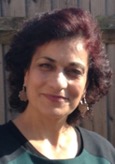Surviving an unsettled pain
, 23 July 2020
Angham Abdullah, Refugee Wales research associate
In my PhD research, I analyzed narratives of the three decades of wars, sanctions and occupation in Iraq and I examined how survivors of traumatic events undergo a “crisis of survival” which transform them into victims to their survival. The crisis of the characters in the narratives takes different forms: sorrow, guilt, uncertainty, fear, and loneliness. However, the characters are determined to live and can put up with the hardships they are facing by means of the strategies of coping: denial, escape, daydreams and through the act of narration.
Not only fictional characters could survive the woes of war, but also the writers of the texts and myself. In my PhD research, I added my personal memories of war to the experiences of the characters and the writers to generate one story of dealing with loss of a country and of loved ones and of putting up with the sorrow of an unfinished political disarray. My recollections of war work as a personal testimony to a historical fact and locate me as a historian and in my thesis also as an author who narrates the history of the political conflict in Iraq.
Unfortunately, this conflict was enlarged to engulf Syria, a very close country to Iraq and with which Iraqis share similar culture, traditions, and values. And above all we share Arabic language which enabled me to work as a volunteering interpreter with the Syrian refugees in the UK since 2012.
In my role as an Associate Researcher in the “Refugee Wales Project,” I am responsible for meeting with Syrian refugees in Wales and of conducting interviews with them. The data collected from the recorded interviews will be translated, analyzed and be part of a book later. Thus, I am offered a great opportunity to add my initial PhD research findings and my personal story of displacement, of longing and of belonging to the stories of refugees who are striving to build a new life in Wales. Together we will produce another narrative of survival and a historical record to generations of Syrians who would be longing to hear testimonies from the witnesses who are seeking to integrate while enduring an unresolved misery back home.